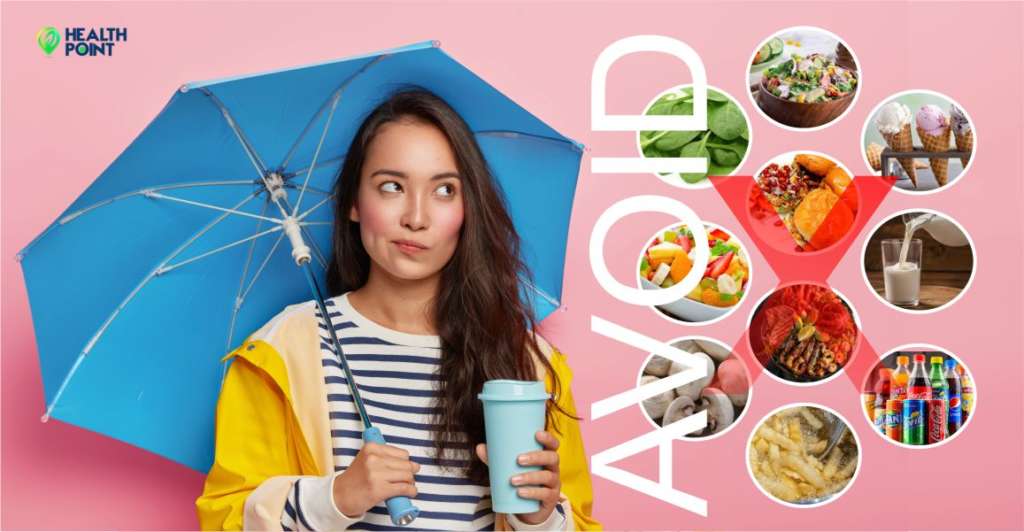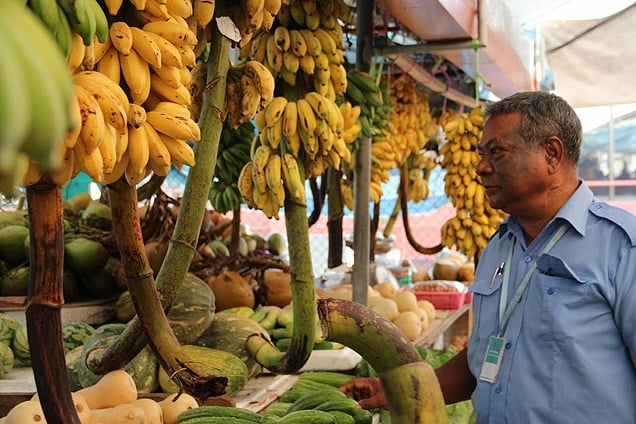Introduction: Why You Should Be Cautious About Food in Monsoon
The monsoon season brings joy with refreshing rain and relief from the heat, but it also increases the risk of infections, digestive problems, and waterborne diseases. During this humid and damp weather, our digestive system becomes weaker, and bacteria thrive in the environment. That’s why it’s important to know the top 10 foods to avoid in monsoon to stay healthy and disease-free.
Choosing the right diet in this season is just as important as enjoying the showers. In this blog by www.healthpoint.co.in, we will guide you through the worst foods to consume during rainy days and provide expert advice for maintaining a healthy monsoon diet.

Top 10 Foods to Avoid in Monsoon Season
1. Leafy Vegetables (Spinach, Cabbage, Lettuce)
Leafy vegetables in monsoon, food to avoid in rainy season
Leafy greens are typically packed with nutrients, but during monsoon, they become risky. The wet and muddy conditions in which they’re grown increase the chances of contamination. They often carry larvae, insects, and dirt which are difficult to clean completely.
If you still wish to consume them, wash them thoroughly with warm salt water and cook them properly. Avoid eating raw lettuce in salads or sandwiches during this season.
2. Street Food (Chaat, Golgappa, Samosas)
Avoid street food in monsoon
Street food is prepared and served in open areas, making it extremely vulnerable to contamination during the rainy season. Water used in chutneys and drinks may be unfiltered and cause waterborne diseases like cholera, typhoid, or food poisoning.
Even though tempting, it’s better to prepare similar snacks at home using clean water and fresh ingredients. That way, you enjoy the flavors without risking your health.
3. Cut Fruits Sold Outside
Cut fruits in monsoon
Vendors often leave cut fruits exposed for hours, attracting flies, dirt, and pollutants. These fruits lose their natural immunity-boosting properties and become breeding grounds for bacteria.
Instead of buying pre-cut fruits, always buy whole fruits and cut them at home, immediately before consumption. Freshly cut seasonal fruits like papaya, pomegranate, and banana are much safer and healthier.
4. Seafood (Fish, Prawns, Crabs)
Avoid seafood in rainy season
The monsoon is the breeding season for most marine animals, especially fish and prawns. During this time, seafood is more likely to be contaminated and spoiled quickly. Poor storage and transport during monsoon make it even riskier.
If you’re a seafood lover, it’s better to skip it for a couple of months and resume consumption post-monsoon when supply is safer and quality improves.
5. Mushrooms
Mushrooms thrive in damp, humid conditions—just like the monsoon weather. Unfortunately, this also makes them highly prone to fungal contamination and spoilage. Many varieties look the same, and consuming wild mushrooms accidentally can lead to food poisoning.
Unless you’re absolutely sure of the source and freshness, it’s best to avoid mushrooms during this season altogether.
6. Fried and Oily Foods (Bhajiyas, Pakoras, Fries)
Fried food in monsoon
Monsoon makes you crave hot and spicy snacks like pakoras and samosas, but deep-fried foods are difficult to digest in this season. They can cause indigestion, acidity, and bloating, especially when paired with sweet tea or cold drinks.
Moreover, reused oil (common in street stalls) becomes toxic and cancerous over time. If you can’t resist, try air-fried or oven-baked alternatives using minimal oil at home.
7. Dairy Products (Milk, Paneer, Curd)
Milk and milk-based products can spoil quickly in the humid weather, especially when not refrigerated properly. Curd and paneer can turn sour or cause gastrointestinal problems if kept at room temperature for too long.
Buy dairy products only from trusted, hygienic sources and consume them within the same day. Boil milk before use and refrigerate all dairy immediately.
8. Carbonated Drinks and Sodas
Avoid soft drinks in monsoon
Most soft drinks contain high levels of sugar, caffeine, and artificial additives, which lower the body’s ability to absorb minerals and weaken digestion. They may also cause bloating and acidity.
Instead of fizzy drinks, opt for warm herbal teas, lemon water, or detox drinks that help cleanse your system and boost immunity.
9. Raw Salads and Sprouts
Salads made from raw cucumbers, carrots, or sprouts are often eaten for a healthy diet, but during monsoon, bacteria and parasites can grow on them, even after washing. Sprouts are especially risky due to the warm and moist conditions needed for their growth.
To stay safe, lightly steam or sauté your sprouts and vegetables before eating them.
10. Cold Desserts and Ice Creams
Avoid cold food in monsoon
Eating cold sweets, kulfis, and ice cream might sound refreshing, but these can cause throat infections, flu, and cold in monsoon. Additionally, dairy-based sweets stored in open conditions may carry fungal infections or spoil easily.
Choose warm desserts like halwa or dry fruits soaked in honey to satisfy your sweet tooth safely.
Doctor’s Advice: Expert Tips for Monsoon Diet
Dr. Neha Sharma, General Physician at www.healthpoint.co.in, explains:
“In the monsoon season, we see a rise in viral infections, stomach issues, and skin diseases caused by poor food hygiene. Most cases are linked to consumption of outside food, contaminated water, or raw vegetables.
My advice: Always drink boiled or filtered water, avoid eating out, and focus on home-cooked, warm meals rich in fiber, vitamins, and immunity-boosting ingredients like turmeric, ginger, and garlic. Wash all fruits and vegetables with vinegar or salt water.”
Doctor’s Tips:
Avoid raw or undercooked food
Say no to roadside eateries
Carry your own filtered water
Add natural immune boosters like tulsi, cinnamon, and turmeric
Eat smaller, frequent meals to aid digestion
Tips to Stay Healthy This Monsoon
Wash vegetables and fruits thoroughly before cooking
Avoid eating food stored in the refrigerator for too long
Drink warm water throughout the day
Use spices like pepper, jeera, and ajwain in meals
Keep your kitchen and utensils dry and clean
Your Health is in Your Hands
Being cautious about your diet during monsoon can go a long way in protecting your health. These top 10 foods to avoid in monsoon are commonly consumed but carry high risks during this season. Staying away from these items and choosing warm, nutritious, and freshly cooked food will keep your immunity strong and your stomach happy.
To get more expert tips on health and seasonal diet plans, visit www.healthpoint.co.in — your trusted guide for a healthy lifestyle.
#MonsoonHealth #FoodsToAvoidInMonsoon #MonsoonDietTips #HealthyRainySeason #DoctorApprovedTips #StayHealthyInMonsoon #healthpointindia #SeasonalWellness #RainySeasonCare

